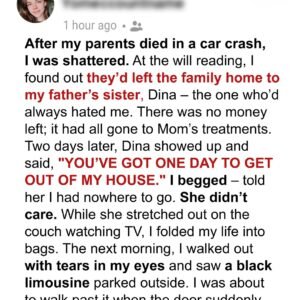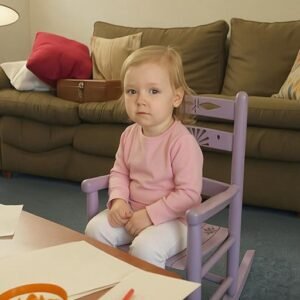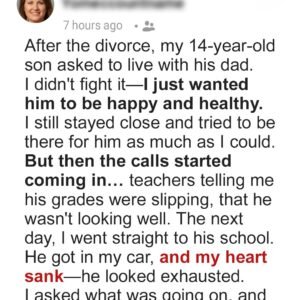he night Daniel died, the sky cracked open and poured grief on the world. I remember the officer standing on my doorstep, soaked through, his voice carrying the kind of news that rearranges your life forever.
Words like “accident,” “highway,” and “I’m sorry” floated around me while I stood still, thinking only of my son upstairs — Noah — fast asleep, hugging the stuffed dinosaur Daniel had given him that morning.
That night, I curled up on Daniel’s side of the bed, clutching his pillow and breathing in everything he’d left behind. I dreaded morning. Dreaded the moment I’d have to tell Noah his dad was gone.
But when the sun rose and my son padded in asking for pancakes, something shifted. Not strength, exactly. More like survival. I sat him on my lap, looked into those wide brown eyes that mirrored Daniel’s, and told him the truth.
After that, life became a slow-motion blur.
I dated, eventually. Most men backed away quietly once they realized the grief came with a ten-year-old who still set a second dinner plate “just in case Dad came back.” I understood. Noah wasn’t just part of the deal — he was the deal.
Then came that New Year’s Eve party.
Jake was by the fireplace when I arrived — rumpled, holding a beer, and looking just as unsure as I felt. He had gentle eyes and a kindness that didn’t need to be announced. When he asked if it was my first time at a party full of couples, I smirked and said, “I’ve had three years of practice.”
“Mine’s been two,” he said, and I noticed how he didn’t flinch saying it — just offered it up plainly, like he’d already done the hard grieving in silence.
We talked for hours. And when he asked for my number and I warned him I had a seven-year-old son, he didn’t blink.
“What’s his name?” he asked instead.
Jake didn’t win Noah over right away. But he paid attention. Thoughtful gifts, not flashy — a space-themed LEGO set because Noah loved the stars. A rare comic tied to an obscure superhero Noah mentioned once. He listened, even when Noah wasn’t speaking to him.
A year later, Jake proposed. I said yes, with shaky hands.
We became a new kind of family. Spaghetti on Wednesdays, hikes on Sundays, and movie nights where we buried ourselves in blankets and argued over snacks.
But the cracks were there — just under the surface.
Noah stayed distant. Quiet. Always polite, never warm. As he grew, so did the tension. Jake wanted to be a parent, but every time he stepped into that role, Noah pushed back.
And then came the night everything broke.
Jake walked in from work, his voice tight.
“Your teacher called,” he told Noah. “You’re not turning in your homework. You mouthed off in class.”
Noah snapped back. “What do you care?”
That’s when it happened — the sentence that changed everything.
“If you can’t follow the rules in this house, maybe you shouldn’t be in it.”
The words hung in the air like ash. Jake looked like he wished he could pull them back the second they left his mouth, but it was too late. Noah turned, walked to his room, and quietly closed the door.
We both sat in the silence, stunned. Jake whispered that he didn’t mean it, but I could barely look at him.
The next morning, something felt off. Too quiet.
I checked Noah’s room. His bed was empty, the covers flung aside. Still warm.
Panic lit me up from the inside out.
We searched the house. Nothing. Garage, yard, nearby streets — empty. And then I remembered the GPS tracker on his phone.
Twenty minutes away. Stationary. My heart dropped.
“I know where he is,” I told Jake.
We drove through fog and silence until we reached the cemetery.
There he was — a small figure kneeling beside Daniel’s headstone.
“Wait,” I whispered, stopping Jake. We watched from a distance.
“I’m trying, Dad,” Noah said, his voice barely carrying. “I don’t hate Jake. I just… I miss you. I don’t know how to be happy and still remember you.”
Jake moved before I could stop him. He walked to Noah, knelt beside him.
“I’m sorry,” he said. “What I said… I didn’t mean it. I was angry. And scared. And wrong.”
Noah didn’t move. But he didn’t run either.
“I’m not trying to take your dad’s place,” Jake said. “But I’d like to help honor him. Take care of you and your mom in a way he’d be proud of. If you’ll let me.”
Noah finally turned. Slowly. Then leaned into Jake’s chest.
That was the moment.
I ran to them. We stayed there, all three of us, crying together — not just for what we’d lost, but for what we were finally ready to build.
Later that night, while Noah showered, Jake quietly removed our wedding photo from the shelf. I watched, confused — until he slid it over and placed a framed picture of Daniel next to it.
“Is this okay?” he asked.
I nodded, throat tight. “It’s more than okay.”
The next morning, Noah came down for breakfast and stopped short. He stared at the photos for a long time, then glanced toward Jake, who was flipping pancakes.
“Want to help?” Jake offered casually. “Your mom says you’re the pancake expert.”
“Dad taught me,” Noah said, then added, “I could show you the blueberry trick.”
Jake smiled. “I’d like that.”
That morning, the house felt different.
We weren’t replacing what we lost. We were learning how to carry it — together.





